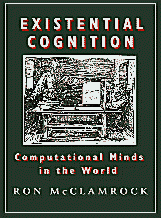 Existential Cognition:
Existential Cognition:
Ron McClamrock
University of Chicago Press, 1995
|
While the notion of the mind as information-processor -- a kind of computational system -- is widely accepted, many scientists and philosophers have assumed that this account of cognition shows that the mind's operations are
characterizable independent of their relationship to the external world. Existential Cognition challenges the internalist view of mind, arguing that intelligence, thought, and action cannot be understood in isolation, but only in interaction with the outside world.
Arguing that the mind is essentially embedded in the external world, Ron McClamrock provides a schema that allows cognitive scientists to address such long-standing problems in artificial intelligence as the "frame" problem and the issue of "bounded" rationality. Extending this schema to cover progress in other studies of behavior, including language, vision, and action, McClamrock reinterprets the importance of the organism/environment distinction. McClamrock also considers the broader philosophical question of the place of mind in the world, particularly with regard to questions of intentionality, subjectivity, and phenomenology. With implications for philosophy, cognitive and computer science, artificial intelligence, and psychology, this book synthesizes state-of-the-art work in philosophy and cognitive science on how the mind interacts with the world to produce thoughts, ideas, and actions.
|
This is by far the best book there is that develops an externalist viewpoint in the context of a detailed analysis of conceptual issues that arise from research in the cognitive sciences. McClamrock deftly handles a great range of issues -- from the Frame Problem to consciousness. Ned Block, Massachusetts Institute of Technology Hundreds of philosophers have written on individualism and anti-individualism, usually addressing Putnam's famous Twin Earth examples. What distinguishes Existential Cognition is that it considers many such issues, drawn from different areas of psychology and from other sciences such as economics, applying to them a uniform set of anti-individualist analytical tools with illuminating results. The book makes a strong case for the anti-individualist view of human beings. William G. Lycan, U. of North Carolina |